Gaza Strip – The past few weeks have been deeply traumatic for Zaki Salameh, a Gaza resident who was working as a builder in an Israeli town when war broke out on October 7.
In the period following the unprecedented Hamas attack on Israeli army outposts and surrounding villages that day – and the relentless bombardment of the Gaza Strip by Israeli forces ever since – Salameh has been arrested, tortured and interrogated.
The 55-year-old said he “deeply regrets” working in Israel. He declined to say where he was working for fear of reprisals by the Israeli army. He is one of at least 18,500 residents of Gaza who had permits to work outside the enclave.
Salameh said he and other Palestinian workers from the Gaza Strip were arrested and tagged on October 8 before being taken to Ofer Prison on the outskirts of the occupied West Bank city of Ramallah. They were summoned for interrogation and tortured on what Salameh described as an electrical chair for several days.
“The Israelis asked us strange questions,” he said. “They wanted to know where the Hamas tunnels are located, where the rocket launchers are placed and how the fighters move in and around Gaza.”
Israeli authorities also interrogated the workers about their neighbours, their residential areas and who lives there, he continued, and threatened to imprison them for the rest of their lives.
“They wanted to know what we knew about the Al-Aqsa Flood operation,” he said, referring to the surprise Hamas attack that killed 1,400 Israelis.
“Some of the young men were tortured and insulted in a very brutal way,” Salameh said. “The questions were ridiculous. The Israelis know exactly who we are, and if we had any ties to Hamas, we wouldn’t even be granted the work permits.”
On Friday morning, the Israeli military said it had released 3,200 workers from Gaza back to the coastal enclave through the southern Karem Abu Salem – or Karem Shalom – crossing.
This followed an Israeli government decision the previous night that these workers would not be granted work permits again.
“Israel is severing all contact with Gaza,” the Israeli government press office said Thursday.
“There will be no more Palestinian workers from Gaza. Those workers from Gaza who were in Israel on the day of the outbreak of the war will be returned to Gaza.”
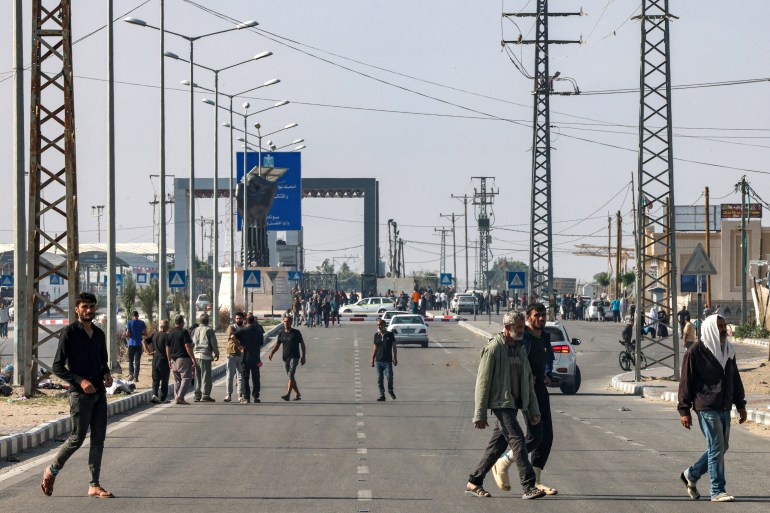 Some of the workers who were stranded in Israel after the October 7 attacks wait near the Rafah border crossing with Egypt to take vehicles to the city of Rafah after crossing into the Gaza Strip on November 3, 2023 [Said Khatib/AFP]
Some of the workers who were stranded in Israel after the October 7 attacks wait near the Rafah border crossing with Egypt to take vehicles to the city of Rafah after crossing into the Gaza Strip on November 3, 2023 [Said Khatib/AFP]
Expelled, arrested, rounded up
Gaza residents with permits allowing them to work outside the enclave were often labourers in construction while others worked in restaurants and malls. The money they earned was a source of some respite after Israel’s 17-year blockade of the Gaza Strip has devastated the economy, resulting in an almost 50 percent unemployment rate.
Those workers granted permits were approved after a strict security examination by Israeli intelligence and the Israeli army. This meant that after a thorough background check, each worker was confirmed as a civilian with no political affiliations in the Gaza Strip or connections with Palestinian armed groups and resistance factions.
But as Israel began bombing the Gaza Strip, the Israeli army began expelling Gaza workers from their workplaces in Israeli cities.
Thousands of workers, like Salameh, were arrested and taken to Ofer Prison. Some were rounded up and held in other undisclosed locations with no communication with their families. Others were dumped at checkpoints in the occupied West Bank and made their way to Palestinian cities with only the clothes they were wearing.
Several Israeli human rights organisations, such as Gisha and HaMoked, said some of the workers had been illegally detained in military facilities in breach of international law. The organisations have sent petitions and individual inquiries to Israeli authorities demanding information on the whereabouts of the workers as well as those of other Gaza residents who had received medical permits to enter Israel and were also rounded up.
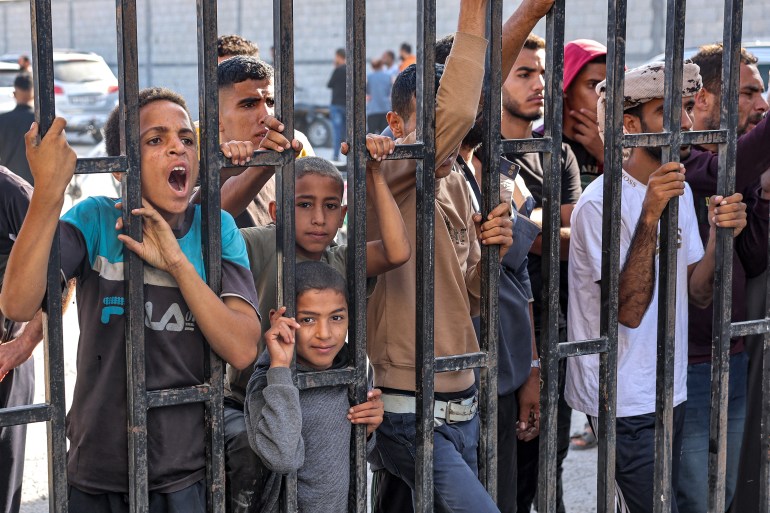 Relatives await the arrival of Palestinian workers who were stranded in Israel since the October 7 attacks as they cross back into the Gaza Strip at the Kerem Shalom/Karem Abu Salem commercial border crossing [Mohammed Abed/AFP]
Relatives await the arrival of Palestinian workers who were stranded in Israel since the October 7 attacks as they cross back into the Gaza Strip at the Kerem Shalom/Karem Abu Salem commercial border crossing [Mohammed Abed/AFP]
Fadi Bakr, who had been working in an Israeli mall, was fired from his job on October 7. The 29-year-old was granted a work permit a year and a half ago, and would usually spend a week at a time in Israel before returning to his family in the southern Gaza city of Khan Younis.
After his dismissal, Bakr made his way to the occupied West Bank and stayed in Hebron with other workers who, he said, were all distraught about the unfolding horrors in the Gaza Strip.
“I was very worried about my young children, my wife and my family,” he said. “The intensity of the bombing in Gaza is unlike anything we’ve ever seen. It’s cruel and brutal, and I could barely be in touch with my family.”
Israeli forces stormed the building Bakr and the workers were staying in a few days later and took them to Ofer Prison.
The workers were detained for 20 days before they were released.
“For the first time, I feel very afraid because I do not know whether I will see my family again or not,” he said.
“The Israelis interrogated us day and night about our relationship with the Hamas movement despite us having no connection to any political movement. We only came to work.”
Workers also said they were mentally exhausted from thinking about their families under constant Israeli bombardment in the Gaza Strip.
Bakr said he was angered by the apparent lack of action taken by the Palestinian Authority to challenge their arrests or check on their welfare.
“How can cities, supposedly under the control of the Palestinian Authority, be raided without question by Israeli forces?” he asked bitterly. “We had no protection, and no Palestinian official came to our defence and did not even ask about how we were treated or about the possibility of our release from prison.”
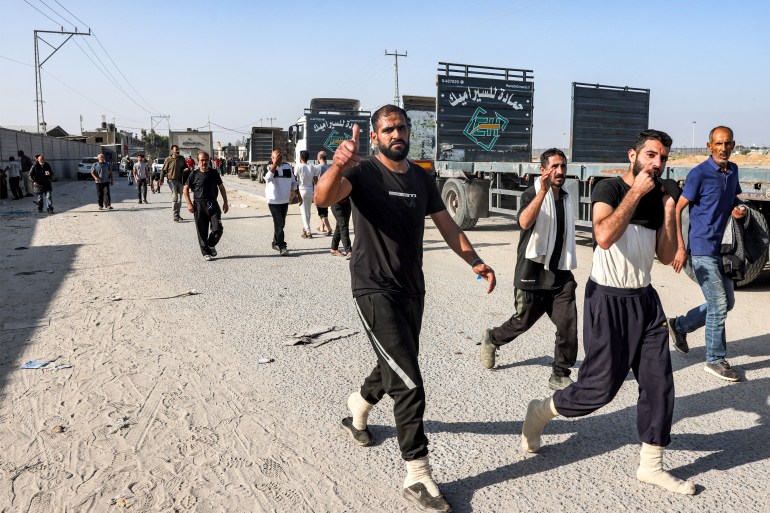 Palestinian workers cross back into the Gaza Strip at the Kerem Shalom/Karem Abu Salem border crossing with Israel in the south of the Palestinian enclave on November 3, 2023 [Mohammed Abed/AFP]
Palestinian workers cross back into the Gaza Strip at the Kerem Shalom/Karem Abu Salem border crossing with Israel in the south of the Palestinian enclave on November 3, 2023 [Mohammed Abed/AFP]
Fate of other workers unknown
The Israeli offensive has devastated the Gaza Strip and killed more than 9,000 people, including 3,826 children. More than 32,000 people have been wounded in the attacks on densely populated areas including refugee camps and residential homes. The United Nations estimated that 45 percent of Gaza’s homes have been damaged or destroyed.
In addition to the blockade preventing Gaza’s access to fuel, clean water and electricity, most of its infrastructure and main roads have been badly damaged.
As the workers crossed into the Gaza Strip on Friday, expressions of fatigue and exhaustion on their faces, they wondered about their families and how to reach them.
Salameh’s family was living in the northern town of Beit Lahiya but were forced to leave due to the heavy bombardment. They are now sheltering in one of the UN-run schools in Khan Younis.
“There were no cars or other vehicles to take me from the far south to the central area,” he said.
The roads are not safe, but he managed to hitch a ride on tuk-tuks and a horse-drawn cart that the relatives of other workers had brought with them to the crossing.
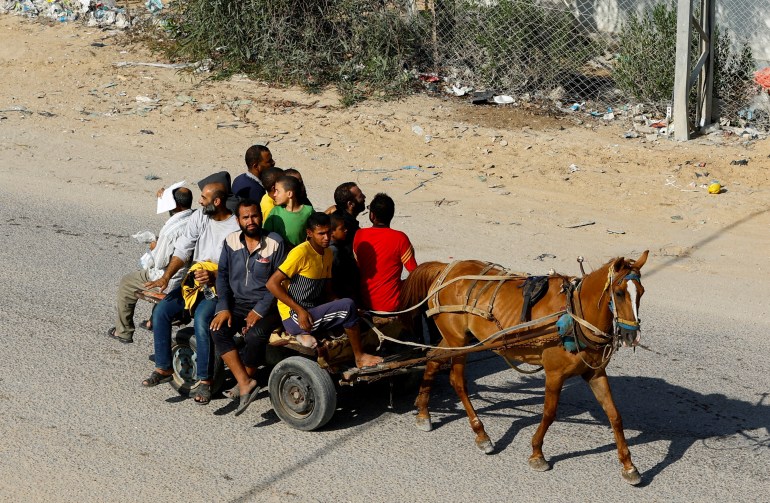 Palestinian workers who were stuck in Israel following the Hamas attacks in southern Israel are transported on a horse-drawn cart amid fuel shortages after they arrive at the Rafah border in Gaza [Ibraheem Abu Mustafa/Reuters]
Palestinian workers who were stuck in Israel following the Hamas attacks in southern Israel are transported on a horse-drawn cart amid fuel shortages after they arrive at the Rafah border in Gaza [Ibraheem Abu Mustafa/Reuters]
The fate of thousands of other Gaza residents who worked in Israel remains unknown.
Tasneem Aqel, who lives in Gaza City, last saw her father two weeks before October 7.
“I contacted him once during the first days of the war, and he told me that he was still working in Israel,” she said. “But then the news began circulating about the expulsion of workers and their deportation to areas of the West Bank.”
When Tasneem tried to call her father again, she got no response. She managed to call her father’s friend, a fellow worker who had left with him through the northern Beit Hanoun/Erez crossing.
“All I found out was that my dad lost his phone while in Ramallah,” she said. “His friend said he didn’t have any news about him, so most likely, my father is still detained in prison.”

 Movie
Movie 5 months ago
137
5 months ago
137 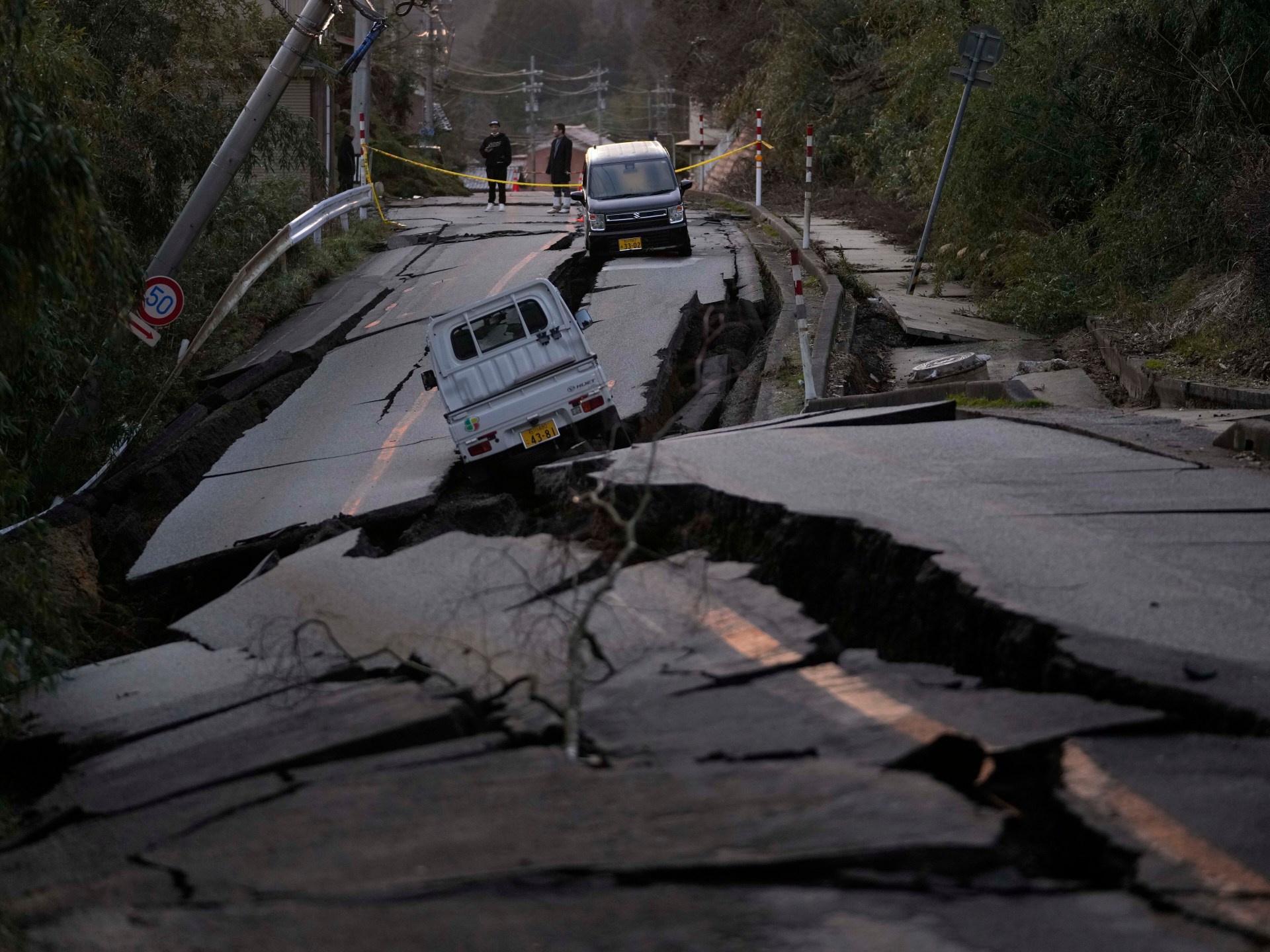
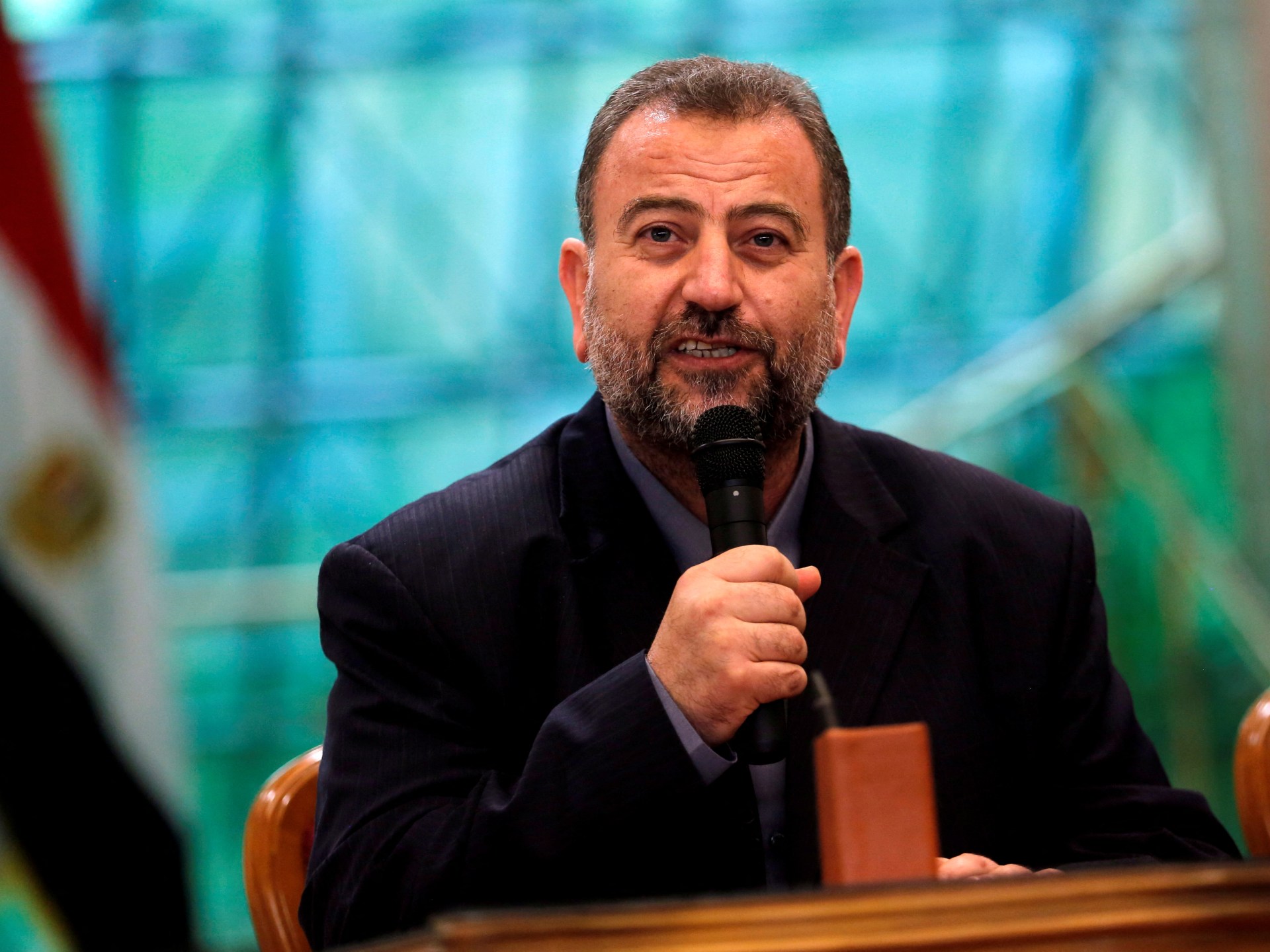





![Presidents Day Weekend Car Sales [2021 Edition] Presidents Day Weekend Car Sales [2021 Edition]](https://www.findthebestcarprice.com/wp-content/uploads/Presidents-Day-Weekend-car-sales.jpg)



 English (United States)
English (United States)